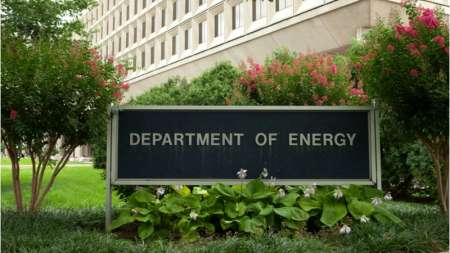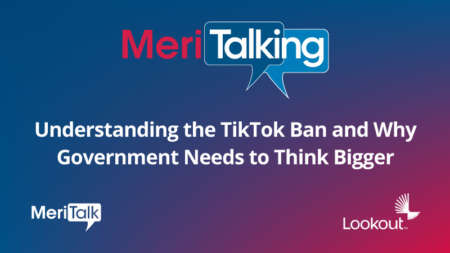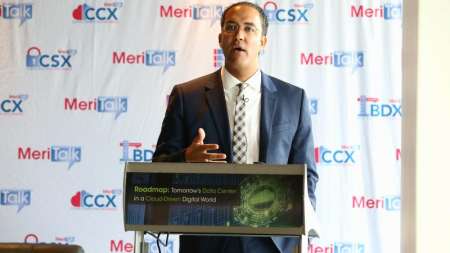General Dynamics Information Technology (GDIT) has become the first systems integrator to join the National Institute of Standards and Technology’s (NIST) post-quantum cryptography (PQC) consortium, the company announced on Monday. […]
Bipartisan groups of lawmakers in the House and Senate have introduced legislation that would prevent winners of CHIPS and Science Act funding from using that money to buy equipment and specialized manufacturing tools from companies based in China or other countries judged to be adversaries of the United States including Russia, North Korea, and Iran. […]
Workday, Inc., which provides cloud-based human capital and financial management platforms to the private sector – and increasingly to government customers – has added the Department of Energy (DoE) and the Defense Intelligence Agency (DIA) to its Federal government customer rolls. […]
Top officials from several private sector firms that are helping the Federal government modernize its technology and cybersecurity capabilities told MeriTalk that last week’s FITARA Scorecard gradings for the largest Federal agencies in several IT-driven categories are shining a necessary light on government’s need to make more progress in implementing longstanding cloud policy directives. […]
Across the public sector, agencies are seeing increasing demand for faster, digitally enabled service delivery – and a better user experience, for both employees and constituents. In this MeriTalking podcast, MeriTalk’s Gail Emery is joined by Joe Jeter, senior vice president of Federal technology at Maximus, to explore how user-centric approach to digital modernization, coupled with emerging technologies, can dramatically improve the citizen, employee, and user experience – the total experience with government. […]
The Federal government and numerous states are concerned that user data collected by some popular apps could be shared with foreign governments, including China. In this episode of MeriTalking, Joe Franco talks with Lookout’s Kristina Balaam about the data that popular apps collect, how it might be used by foreign governments, and how bans on Chinese apps can be enforced. […]
The White House is targeting June to release its implementation plan for the National Cybersecurity Strategy (NCS) unveiled early last month, and private sector technology leaders are eager to see the Office of the National Cyber Director’s (ONCD) public strategy that aims to charge Federal agencies, the private sector, and civil society with specific cybersecurity action items. […]
Cloud security provider Zscaler has named Laura Fritzlen Vice President, Public Sector Alliances and Channels. […]
Aaron Weis, the former Department of the Navy chief information officer (CIO), started a new job Monday as the managing director of technology at Google Public Sector (GPS). […]
The U.S. Customs and Border Protection (CBP) has awarded Accenture Federal Services an IT infrastructure operations and modernization contract totaling $380 million. […]
The First Responder Network Authority (FirstNet) has named Joseph Wassel executive director, which the organization regards as the equivalent of its chief executive officer. […]
Cyberattacks, connected devices, and data are growing exponentially every year, into the billions, trillions, and zettabytes, respectively. Neither people nor traditional cybersecurity solutions can keep up with the data or the attacks. In this episode of MeriTalking, NVIDIA’s Killian Sexsmith and Matt Penn outline the burgeoning cybersecurity problem agencies face today and explore the Federal […]
A new report from cloud security provider Zscaler titled The State of Zero Trust Transformation 2023 report finds that more than 90 percent of IT leaders surveyed are implementing zero trust architecture I connection with their cloud migration strategy over the next 12 months. […]
A new research study found that nearly 90 percent of Federal agencies plan to adopt 5G technology into their infrastructure to support mission imperatives, but challenges in cybersecurity and cost still cause major concerns. […]
People are the most important aspect to securing network systems, yet they possess the ability to be the most vulnerable part of any highly secure system, according to Phil Fuster, vice president of sales at Proofpoint. […]
Rep. Raja Krishnamoorthi, D-Ill., championed the vital role that skills-based education can play to help start filling millions of job openings in United States tech-related sectors. […]
Federal intelligence agencies have grown increasingly comfortable with using social media tools to spread the word about their work, officials said this week. […]
The National Oceanic and Atmospheric Administration’s (NOAA) National Weather Service said on June 28 that it began its first operational run of weather modeling using new twin supercomputers supplied by General Dynamics Information Technology (GDIT) that provide three times the computing capacity to support advanced weather modeling. […]
The accelerated move toward digital transformation spurred by the COVID-19 pandemic has proven to be challenging to many as they have further embraced hybrid IT structures, according to a recent report from SolarWinds. […]
The National Reconnaissance Office (NRO) has finalized three awards as part of its largest-ever commercial satellite imagery contract effort, marking a historic expansion of NRO’s acquisition of commercial imagery on behalf of the U.S. government. […]
The Federal Communications Commission (FCC) has awarded $203.6 million in an indefinite-delivery, indefinite-quantity Application Development Support Services Contract (ADSS) as part of the agency’s IT modernization effort, according to a notice on SAM.gov. […]
When NASA needed to land a probe on Mars, the landing sequence was the riskiest part of the multi-year, multi-billion-dollar mission-critical program. Prior to launch, NASA simulated the process under all potential weather and environmental conditions. Leaving nothing to chance, they used DDN storage solutions to fuel the artificial intelligence (AI) and advanced machine learning applications. After the successful landing on Mars, DDN was further entrusted with the data that made the 91-million-mile journey back to earth for analysis and other simulations. […]
In the last few years, the city of St. Louis has become a hub for public and private innovators of geospatial intelligence (GEOINT). […]
The late-day warning on Monday from President Biden and White House national security officials that the Russian government is exploring options for potential cyberattacks against U.S. critical infrastructure targets appeared to turn many heads in the Federal cybersecurity community that is by now long-used to receiving and generating cybersecurity advisories. […]
Proving that there is no substitute for good timing, TaxBit – a provider of automated tax and accounting services for virtual currencies – opened up its new Washington office earlier this month amid growing policy and legislative action that may end up wrapping cryptocurrencies more tightly into “traditional” economic models. […]
The Department of Homeland Security’s (DHS) Federal Emergency Management Agency (FEMA) has awarded AT&T four Enterprise Infrastructure Solutions (EIS) contracts to modernize the agency’s telecommunications and transition FEMA off the Networx contracts, AT&T announced. […]
The Telecommunications Industry Association (TIA) released the first-ever supply chain security standard (SCS 9001), developed specifically to aid the information and communications technology (ICT) industry. […]
General Dynamics Information Technology (GDIT) President Amy Gilliland talked about the vital role that system integrators play for Federal agencies, along with growing agency appetite for zero trust security technologies, during an address to the Northern Virginia Technology Council (NVTC) on Jan. 14. […]
Former Texas Republican Rep. Will Hurd – who was a leading voice on technology issues during his three terms in Congress and now advises on similar issues as a managing director at Allen & Co. – said this week that a national data privacy standard is needed to put ground rules in place for wider use of artificial intelligence (AI) technologies. […]
Software and cloud services provider Oracle Corp. said today it agreed to buy Cerner Corp., a provider of digital information systems for the health care provider market, in a deal valued at $28 billion. […]





























